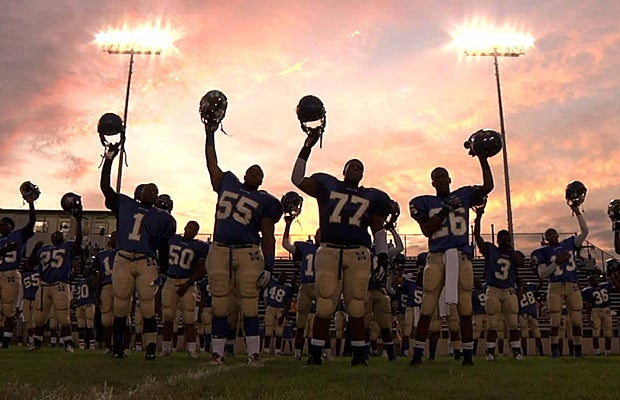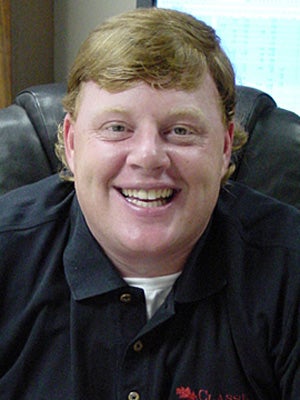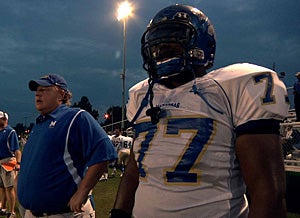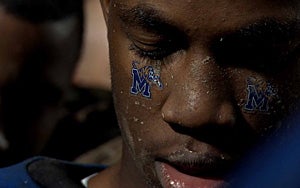Oscar-winning high school football documentary faced obstacles on and off the field on its way to the ultimate success.

The Manassas Tigers overcame massive odds in 'Undefeated,' but the film itself had many obstacles on the way to success as well.
Courtesy photo
As great as made-for-Hollywood sports movies like "Field of Dreams" and "Hoosiers" can be, there is nothing that tugs on the heartstrings like an emotional sports documentary.
That's just one reason why "Undefeated," the 2011 documentary about head coach Bill Courtney and the
Manassas (Memphis, Tenn.) football program, went from obscurity to an Oscar in a matter of two years.
The film follows the 2009 season at Manassas, a program in one of the poorest areas of Memphis that had long been a football doormat — a program that was on the brink of extinction when coach Courtney first began there in 2002.

Bill Courtney, former Manassas coach
Courtesy photo
After being convinced by a friend who was volunteering with the Manassas team, Courtney, who had coached for many years before going on hiatus to start his own business, attended a spring practice of a team which had gone 5-95 over its previous ten years and had a roster of only 17 players.
"These kids come from abject poverty and lots of hopelessness and lots of loss and just all the cliché inner-city stuff that you see in the media and movies," said Courtney. "These kids were those kids, and despite it they were ‘Yes sir,’ ‘No sir.’
"They wanted to learn. They were just looking for someone to believe in them."
It was love at first sight for Courtney, who took over the program as a volunteer in the fall and saw immediate results.
"That first year we won four ball games with 17 kids and they thought I was a fat, red-headed version of Knute Rockne," he said.
Things took off from there and when the film crew arrived in 2009, the Tigers were on the verge of accomplishing something the Manassas football program had never seen before — a playoff victory.
The film shows how Courtney and his team had to deal with numerous problems, both on and off the field, throughout the remarkable season. It was a season that tested Courtney's resolve as a coach, but he continued to stress character over wins and losses.
Courtney had seen bad coaches in the past, and he noticed that often times they would get too caught up in trying to "scheme their way to victory." As a result, Courtney takes more of a personal approach to coaching.
"You’ve got to be strong on X’s and O’s," he said. "But more importantly you need to have kids that are willing to lay it on the line for you. You’ve got to have kids that are willing to give it all — kids that understand that there’s no such thing as a finish line and you don’t quit.
"The only way you do that is to build a relationship with your players and find out who they are: what their fears are, what excites them and what hurts them and how you can yell at one kid to motivate him but you have to pat another on the fanny right next to him because they’re motivated by different stimulus. I believe that you surround yourself with good talent and you let players win games after you’ve won your players."
The film, which comes out on Blu-Ray and DVD Tuesday, shows Courtney doing just that. He can be in a shouting match with a player one minute, and crying with him in an embrace the next.
A True Underdog StoryBut how exactly did the small Memphis school with a program on the rise catch the attention of filmmakers in the first place? For that, they can thank the best football prospect in the school's history: O.C. Brown.
Brown, a 6-foot-2, 300-pound lineman, was drawing interest from many of the nation's top Division I programs, including the University of Tennessee, thanks in large part to a
jaw-dropping YouTube highlight reel that showcased Brown's speed and agility for his size.
Eventually a story was posted on a Tennessee recruiting site that explained how Brown was living with a Mannassas assistant coach part-time in order to help get his grades up and was being driven to school on those days by none other than coach Bill Courtney. The film also explains how tutors refused to travel to the area where Brown lived.

Courtney with lineman O.C. Brown.
Courtesy photo
The story was noticed by a Tennessee alum, Rich Middlemas — who just happens to be a filmmaker — and he traveled to Manassas with the intent of producing a small documentary on Brown's unique story.
After setting foot on campus, it didn't take Middlemas long to realize that the story was much bigger than he had imagined.
"He went back to L.A. and four weeks later they showed up in Memphis with one borrowed car, the three of them living in a two-bedroom apartment, and a very small budget and two camcorders and started making a movie," said Courtney. "That was it. No lights, no sound, no nothing. Just a couple of hipsters with a couple of camcorders and a guy named Rich running around having people sign that it was okay that they were on film."
The filmmakers shot for a year and then returned to Los Angeles and edited for another year. Still, there was little hope that the movie would ever get the widespread distribution they thought it deserved.
"Real candidly, nobody ever thought this thing would amount to much of anything," said Courtney. "Austin's South by Southwest film festival was the first time it ever showed. After its first showing, seven hours later on the second showing there were executives from Weinstein, Paramount, Sony, Universal, all these studios. I’m told that after the second showing there was kind of an all-night bidding war on the thing until early in the morning."
The winner was the powerhouse Weinstein Company, producer of previous Best Picture winners "The King's Speech" and "The Artist." Once what Courtney called the "Weinstein machine" got behind it and believed in it, the sky was the limit for the previously unknown film.
"The irony of it is, 'Undefeated,' you know, the kids not being defeated by their circumstances and rising above everything that they had to do — in large part the production and the direction and everything about the movie itself also personifies that same thing. Truly an underdog story," Courtney said.
The underdog story was officially completed on Feb. 26, 2012, when the shocked filmmakers walked on stage to accept the Academy Award for Best Documentary Feature.
A Road Map and a ChanceIn addition to Brown, the film focuses on two players who faced grave circumstances both on and off the field. One is Chavis Daniels, a linebacker who at the film's start had recently been released from juvenile detention, and the other is Montrail "Money" Brown, a captain and model student whose world is turned upside down by a midseason setback.
When you watch the film it's easy to build a personal attachment to these players, so you can imagine what it was like for Courtney to coach them.
He said that he speaks with those three young men regularly, but he also wants to emphasize the impact that the rest of the players had on his life.
"Something you need to realize is there were 18 seniors on that team," said Courtney. "There’s a story under every helmet. You just can’t make a 15-hour movie so they focused on those three players, but there are 15 others that were equally important to me and I certainly do my best to keep up with all of them."

Courtney had to gain the trust of his players.
Courtesy photo
Courtney, who grew up without a father, left Manassas after that season to coach at his children's high school,
St. George's (Collierville, Tenn.), so he could spend more time with them. There he proved that his coaching skills could adapt to the new environment, leading the team to back-to-back state championship games and winning the title in 2011.
He will not be coaching at St. George's in the 2013 season, and has yet to determine his next step.
"It's kind of up in the air. I'm a free agent. I'm the player-to-be-named-later right now," he said with a laugh. "The truth is I really haven't decided what I want to do yet."
Courtney stresses that his time at Manassas changed him in many ways, but most importantly it opened up his eyes to a segment of society that he feels is often ignored and misunderstood.
He used to believe that, given the opportunities
available in America, there was no reason for a person to be stuck in a
cycle of poverty. But after seeing the kids at Manassas, he says nothing
could be further from the truth.
"When you’re in generational abject poverty and just hopelessness and loss and you’re surrounded by it, and that’s all that you see coming up, then that’s all that you expect life is," he said. "If that’s what your reality is and that’s all you see and you’ve never traveled more than 10 miles from the neighborhood that you were born in, then why would anybody expect them to have any kind of road map to success? Why would anyone expect them to know any better or be able to achieve any more than that when that’s all they see, because that is their reality?
"It softened me in terms of my understanding of what really goes on in areas of our society, but it also strengthened my resolve that this is still a country in which those people can still rise above their circumstances provided that they’re given a road map and a chance. ... Someone just has to love them enough to help them to see that way."
Below is an exclusive clip from the Oscar-winning film, "Undefeated." Be sure to check the MaxPreps Facebook Page and MaxPreps Twitter account for a chance to win a free Blu-Ray copy of the movie.